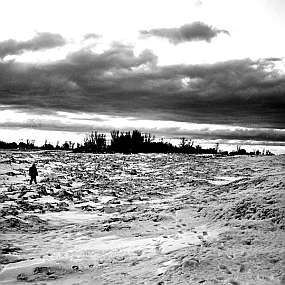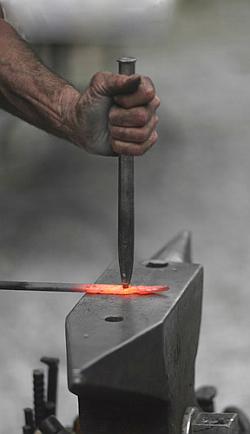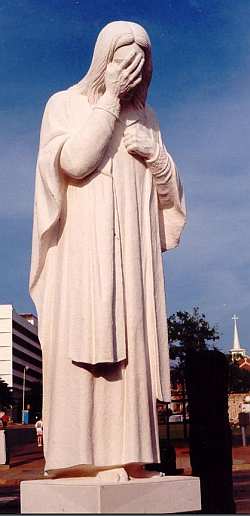At 16, I read through Acts and came away understanding that the pivotal disciple in the book was not Paul but the man who stood behind him, Barnabas. In those words, God said to me, “Be a Barnabas. Help raise up future Pauls.”
I entered college a few years later and studied robotics because I enjoyed tech and knew there would be money in it. But after two years, I felt hollow on the inside. I realized that while I was good at computer-related things, it wasn’t where my heart was.
On completion of my sophomore year, I worked the summer at a Christian camp. Not any camp though, but the one that six years previously was the place where I met the amazing manager of the camp, who introduced me to Jesus and changed my life forever.
I had a rough first week as a counselor. I had a cabin full of rowdy boys from Cleveland who did nearly everything wrong. Yet at the end of the week, I’d seen how Jesus had touched them. I’d understood something about the Great Commission I’d never grasped before.
After the kids left on Friday after dinner, the staff had its worship and communion service. As I partook of the Lord’s body and blood, I remember thinking that each of us had been consecrated by the Lord for this work. Each of us had a holy calling.
Following the blessing of that worship, seven of us piled into John’s enormous, early ’60s convertible (an Impala, or maybe a Caddy) and headed into town for ice cream. John, Lori, and Shawn took the front seat, while Keith, Michelle, Ruth, and I sat in back. The long-persisting, mid-June sun crouched low on the horizon, the last of its rays golden on our faces as we sped west, the warm wind tossing our hair. Around us, katydids poured out songs of love, and the world burst with life and possibilities.
At the ice cream parlor, Ruth and I hunkered down in a booth and talked about what it meant to have a mission in life, to discover what God intended for each of us, how He would use us, and what the future might hold. I remember feeling something change in me, as if I’d discovered a great truth about where I stood in the vast cosmos, and how the Lord could use me going forward.
On the way back home, under a heavens aglisten with stars, John turned on the radio. A lone acoustic guitar built into a full band, leading into these haunting lyrics:
Ooh, I’ve been running down this dusty road.
Oh, the wheel in the sky keeps on turning;
I don’t know where I’ll be tomorrow.
I considered those words a sign of hope. That not knowing where I would be tomorrow was a sign of God’s joy in taking those who love Him to wonder-filled, unexpected places.
We cruised past a tiny oil pumping station, and a giant ball of orange-yellow erupted from a pipe and roiled the sky, turning night to day. When I looked at the faces of the six around me, I could see the fire dancing in their eyes.
I remember thinking, It will never be better than this.
The events of that summer made it clear that robotics wasn’t the future for me. I didn’t return to college in the fall.
Back home, with “what next?” occupying every thought, I asked to meet a pastor friend of mine named Terry. On a lovely September day, I sat in the courtyard of his church and waited for him. An ancient woman with a cane shuffled toward the bench I sat on. She moved about as slowly as a person can and still have the motion be considered forward progress. She eased herself down beside me, took a deep breath, and folded her white-gloved hands. After a moment, she turned to me, called me by name (though I had no idea who she was), and told me that she had been talking with God about me. She then said that God had told her to tell me to pursue my calling of being a Barnabas and to do so in the environment I enjoyed the most. I was stunned by her words. Just then, Terry walked out of the building to my right. I waved to him then turned to the woman. She was gone. I asked Terry who she was, but he said no one had been sitting beside me.
I love the outdoors. I’m a nature boy. I love working with people who desire to know God more deeply, people who don’t want the status quo in their Christian life, who are looking for something more.
Armed with what I’d experienced, I understood that God had shown me a direction. And I took it.
It wasn’t easy. I worked summers in camping ministry and filled in the rest of the year. Eventually, I found full-time work in that field. Even though I had ups and downs, I believed I was on the right course. I started ascending in responsibilities. I trained counselors, devised and developed curriculum and programs, even worked as a camp manager.
But eventually, at the age of 27, my lack of a college degree caught up with me. Doors started closing.
After leading a weekend retreat for my church, someone said that I had a real gifting for this kind of work and that I should pursue a degree in the field. The words stuck.
As it was already late March, I’d missed every deadline to apply to college, but I did so anyway. In mid-April, Wheaton called. I drove up, interviewed, was told they had a scholarship for older students returning to college in Christian Education, and a week later I was accepted and told I had a full-ride for my academic payments. I immediately enrolled in classes related to camping and a month later spent that summer at the college’s camp in Wisconsin.
It all seemed like a dream.
I graduated at the top of my class in 1992. I even won the Senior Class Scholarship for the most deserving senior class student.
I’d worked in some of the best camps in America by then. The president of Christian Camping International and the foremost authority on outdoor education in Christian camps were two of my references. My résumé was golden. Everything was working for me as of May 1992.
Fast forward nearly two and a half years and I’m selling computers, wondering what the heck happened.
The first wave of Catholic priest scandals hit right as I was graduating. In the aftermath, being single and 30 years old didn’t endear me to many camp leaders. Being married made one safe was the thinking, I guess, though I knew that was a lie. Still, the golden résumé, prayer, and fasting couldn’t overcome the news headlines. It was a terrible time. I couldn’t believe what I was subjected to.
Yet I had to put food on the table.
After the last soul-crushing rejection from a camp that reneged on their offer of a management and curriculum design job when they learned I was single, I threw in the towel.
A few years later, I was married and working in Silicon Valley for Apple then at NASA. Then came a child and a mortgage. The bottom fell out of tech and I changed careers yet again.
I live on a proto-farm now and write for a living. Most of my income goes to pay for insurance policies. My 9-year-old son is gifted and bored with school. He attends a special program for gifted kids each Saturday. This last Saturday, his engineering class of about 30 kids built circuit boards. My son was the first done with his. I worry how we will meet his educational needs.
The garbage needs to be taken out. Someone has to cut the grass. Weeklong work on taxes beckons. Gotta fill the fridge again. Census forms. The truck breaks down. How do we get to swim lessons now? Did we send in the vehicle registration forms? What day is it today? How did another week fly by?
The juggling goes on an on. So many balls to keep in the air.
Oh, the wheel in the sky keeps on turning;
I don’t know where I’ll be tomorrow.
Twenty-seven years after seven young people piled into a huge ’60s convertible and drove into the dream of a future filled with God’s purposes, I stand on the side of the road, lost in the Land of Inconsequence, choking on the exhaust fumes.
I spent this last Sunday morning with tears in my eyes.
That’s my story. I believe it’s one that many other Christians share, though the details are different. I think that church pews around America are filled with middle-aged people wondering what happened to the mission they embraced years ago. Life became cubicles and rush hour gridlock and the smirk on the face that accompanies hearing the dream stories of youth who are poised to change the world. Those were our stories—once.
It feels like hell living a life of no consequence, counting time until we go to heaven and receive whatever meager reward we earned, based mostly on what we accomplished for the Kingdom when we were barely out of childhood. The Land of Inconsequence is a terrible place to dwell, yet the population grows daily.
God knows most of us who dwell in that land would prefer to be elsewhere. We’d like nothing more than to cast off the burden of a life buried in bureaucracy and striving. We don’t want to look at the mission of the Kingdom of God and think, Hey, nice fairy tale. We want to be more concerned with the fact that Christians in India and elsewhere face persecution, but we’re stuck on the phone arguing with the electric company, trying to figure out why our electrical bill is twice as high this month.
All the while, what we once were eats at us. The old mission claws at our heart, but we don’t know how to get back to it. We don’t know if we could even perform that mission should it one day open up again. And the days keep falling from the calendar.
Some will say that God closes those doors due to sin, stupidity, and sloth, but I don’t know if that’s always the case. Sometimes, things just are. Yet it bothers me that so many Christian people who once burned brightly now sit in a pew somewhere on Sunday and lament what might have been. They had a mission once. Now they pay endless bills and kill themselves to keep up with the ever-growing numbers on those pages.
I wish I had an answer for this, but I don’t. I’m trapped in the mire too. All the doors closed one day, except for one, and in taking it there seems to be no return.
Is this a sad post? Sure. But I don’t think we can run away from sadness. As Christians, we must be able to deal with all of life’s challenges in ways that reflect the truth of God. Sadness is part of the human condition, and God does not shrink from speaking to it.
The hope that I hold out is that God has an answer. We just may not understand it. Do I think that God is happy that so many people dwell in the Land of Inconsequence? No. But if the Church doesn’t acknowledge the problem, how can we expect to see that change?
I would love nothing more than to get believers together and raise this issue. It’s a dirty little secret, I think, and dirty little secrets need to be brought into the light of Christ and exposed before the people of God. Perhaps if we did this, God would work through us in ways that would help free people to return to those long-lost missions and find a way to escape an inconsequential life.
 In my 35+ years as a Christian, I’ve heard a lot about accountability. In Evangelical ranks, the most common term of use is accountability partner.
In my 35+ years as a Christian, I’ve heard a lot about accountability. In Evangelical ranks, the most common term of use is accountability partner.

 would we have government welfare and the burden of having fostered a society-wide victim mentality?
would we have government welfare and the burden of having fostered a society-wide victim mentality?